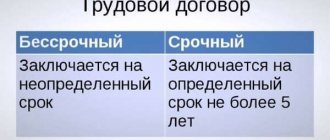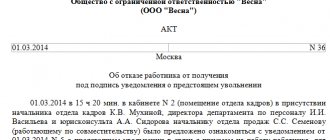Date of entry into force of the employment contract
An employment contract usually comes into effect on the day it is signed. However, if the contract specifies other dates, then they are considered valid.
By starting work ahead of time, the employee does not have any rights and obligations under the contract. Again, unless otherwise stated in the contract. If the contract does not specify the start date of its validity, then the employee is obliged to begin his duties on the next day after signing.
Also, the contract may not specify specific start dates, but a period after which the employee is obliged to return to work. For example, after a month or a week after imprisonment.
Such cases are rare and in most cases are concluded with enterprises providing seasonal or periodic work.
An employment contract is a document that sets out the working conditions for both the manager and the employee. The Labor Code provides for the procedure for drawing up a contract and assigning rights and obligations in Articles 21 and 22.
The entry into force of an employment contract implies the beginning of the fulfillment of the terms and conditions by the parties to the contract. If the employment contract is not drawn up correctly, then the start of work is considered to be the day on which the employee actually began his duties.
Rights and obligations
From the moment the employment contract comes into force, the employer and employee acquire the rights and obligations stipulated by this contract. So:
- disciplinary measures and incentives may be taken against the employee;
- the employee may be sent for training or advanced training;
- the work time from the entry into force of the employment contract must be counted towards the length of service;
- the employer becomes obligated to make contributions to state funds, etc.
Cases when an employee did not start work within the specified period
If the employee does not begin duties on the contract start date, the manager has the right to terminate the contract. Sometimes the contract specifies a period that is given to the employee in cases of force majeure. For example, the contract may specify the date it comes into force and the period within which the employee is obliged to begin fulfilling his obligations.
If the employee fails to show up for work, the contract is canceled and is considered not concluded. The manager is not obliged to find out the reason for the employee’s absence from work. In this case, the manager does not bear any responsibility to the employee, and the employee does not have any rights in relation to this enterprise.
But an employee is not deprived of the right to receive compulsory social insurance payments if an insured event occurs during the contract period.
If an employee does not come to work for a good reason, then he needs to notify management about it, and then confirm it with documents. In this case, the manager draws up a special act in which all documented facts are written down. If the employee cannot prove that his absences are justified, then the contract is terminated, and this act is considered the official reason for termination.
The Labor Code does not prescribe a waiting period for an employee at the workplace if he went on sick leave immediately after signing the contract without starting his duties. How long a manager should wait for his employee is not regulated by law.
In addition, the manager does not have the right to hire another employee for this position. But the manager can cancel the contract by notifying the employee. And if the employee does not protest against the cancellation, the manager can hire a new specialist.
An employee’s absence from work and termination of a contract cannot be an obstacle to drawing up and concluding a new contract if both parties to the contract consider this necessary.
The procedure for the entry into force of an employment contract
2 and 3 tbsp. The Labor Code of the Russian Federation clearly regulates the procedure for the entry into force of an employment contract. If the employee does not begin to fulfill his duties prescribed in the employment contract, then the contract loses its force.
The contract specifies the date of its entry into force. If one is not specified, then the employee must begin work the very next day after signing the employment contract. Along with the employment contract, the manager must also issue an order for the employee’s employment. The dates in the order and the contract must match, and this date will be considered the official start date.
If an employee enters a position that needs to be approved, then the order states the date when the manager approved the employee in this position.
What is the last day of dismissal if it falls on a holiday?
On Friday, the employer issues a dismissal order. It turns out that the order will contain a later dismissal date than the date of signing the order, which does not contradict labor legislation. The employee must be familiar with the order against signature.
Info
On the last day of work, he is given a work book and the final payment is made to him. This position is based on the opinion that a day off can be a day of dismissal, which is also confirmed by judicial practice. Thus, employees dismissed due to staff reduction filed a lawsuit to declare the dismissal procedure illegal, including due to the fact that the date of dismissal, which fell on the expiration date of the two-month notice period, fell on a day off.
We invite you to read: The employment contract was terminated part-time
the emergence, change and termination of the rights and obligations of the parties to the employment relationship. The Code distinguishes the procedure for calculating terms depending on the emergence or termination of labor rights and obligations. The date of their occurrence is the calendar date that determines the beginning of the corresponding period.
make a dismissal on the employer’s first working day or involve a personnel officer and an accountant (with their consent) to work on a day off to formalize the dismissal and pay. Termination of a fixed-term employment contract Opinions regarding the termination of a fixed-term employment contract are also divided. Some experts believe that it is possible to dismiss an employee if the contract expires on his day off, on the last working day preceding the day off. This is confirmed by judicial practice. Yes, Sh.
Important
Labor relations of the Russian Labor Code arise between an employee and an employer on the basis of an employment contract concluded by them in accordance with the Labor Code of the Russian Federation. An employment contract must be concluded in writing, as required by part one of Art.
Info
Labor Code of the Russian Federation. In accordance with Art. 57 of the Labor Code of the Russian Federation, when concluding an employment contract, it indicates the date of conclusion of the employment contract, and also, as a prerequisite, the start date of work from which the employee begins to perform his job duties. An employment contract comes into force from the day it is signed by the employee and the employer, unless otherwise established by federal laws, other regulatory legal acts of the Russian Federation or the employment contract, or from the day the employee is actually admitted to work with the knowledge or on behalf of the employer or his representative (part one Art.
61 Labor Code of the Russian Federation).
Cancellation of the contract
If the employee does not begin his duties within the specified period, then, as mentioned above, the manager has the right to terminate the contract with him. But responsibilities in this case mean all the responsibilities specified in the contract.
The wording of contract cancellation will look like “did not start work.” But this does not apply to cases where an employee went to work but did not begin to perform his duties.
If the employee does appear at the workplace, but does not begin his work, cancellation of the contract is no longer possible. In this case, other procedures and rules apply. So, for example, the manager can fire him or take other exacting measures, but not cancel the contract.
No contract
Every organization is required to enter into a written employment contract between the manager and the employee. The contract must be in two copies, one of which goes to the employee, and the second remains within the walls of the organization. An employee, by law, begins to work from the date specified in the contract, i.e. the contract must be present before the employee begins his official activities. But it is not always the case.
Often an employee begins to perform his duties without signing an employment contract.
This is against the law. If these violations are identified, all consequences fall on the manager; the employee is not responsible for them. Disciplinary, administrative or criminal sanctions may be applied to the manager.
For example, while an employee is working without an employment contract, the manager does not pay taxes. If such cases are detected, a fine is imposed on the manager. In addition, the manager will be required to pay all hidden taxes.
If a manager, without concluding a contract with an employee, infringes on his rights (for example, does not pay wages, detains him at work, does not pay sick leave, etc.), then he may incur criminal liability under Article 293 of the Criminal Code of the Russian Federation “negligence.” "
Fixed-term and open-ended contract
An employment contract can be:
- urgent;
- indefinite.
If the contract does not specify the period for which it is concluded, then it is considered unlimited. If the contract specifies the terms of its validity, then the contract is fixed-term. Such a contract is concluded in several cases:
- when hiring an employee for seasonal work;
- when hiring an employee to replace a temporarily unemployed employee;
- when hiring an employee to work abroad;
- when hiring an employee to perform a certain amount of work.
A fixed-term employment contract is considered valid only for the terms specified in it. At the end of the contract, the manager can extend it under the same conditions.
Author of the article
LABOR LAW
Conditions for concluding an urgent
According to Art. 58 of the Labor Code of the Russian Federation, employment contracts can be concluded : for an indefinite period; a certain period of no more than 5 years (fixed-term employment contract), unless a different period is established by the Labor Code of the Russian Federation and other federal laws.
If the employment contract does not specify the duration of its validity, the contract is considered to be concluded for an indefinite period. A fixed-term employment contract is concluded in cases where the employment relationship cannot be established for an indefinite period, taking into account the nature of the work to be done or the conditions for its implementation, unless otherwise provided by the Labor Code of the Russian Federation and other federal laws. When neither party has requested termination of a fixed-term employment contract due to the expiration of its term, and the employee continues to work after the expiration of the employment contract, the contract is considered concluded for an indefinite period. An employment contract concluded for a certain period in the absence of sufficient grounds established by the body exercising state supervision and control over compliance with labor legislation and other regulatory legal acts containing labor law norms, or by a court, is considered concluded for an indefinite period. It is prohibited to conclude fixed-term employment contracts in order to evade the provision of rights and guarantees provided to employees with whom an employment contract is concluded for an indefinite period. A fixed-term employment contract can only be concluded by mutual consent of the employee and the employer. The grounds for concluding such an agreement are provided for in Art. 59 of the Labor Code of the Russian Federation to replace a temporarily absent employee, who, in accordance with the law, retains his place of work; for the duration of temporary (up to 2 months) work, as well as seasonal work, when, due to natural conditions, work can only be carried out during a certain period of time (season); with persons entering work in organizations located in the Far North and equivalent areas, if this is related to moving to the place of work; to carry out urgent work to prevent accidents, accidents, catastrophes, epidemics, epizootics, as well as to eliminate the consequences of these and other emergency circumstances; with persons applying for work in small business organizations with up to 40 employees
(in retail trade and consumer service organizations up to 25 employees), as well as to employers - individuals; with persons sent to work abroad; for carrying out work that goes beyond the normal activities of the organization (reconstruction, installation, commissioning and other work), as well as for carrying out work related to a deliberately temporary (up to 1 year) expansion of production or the volume of services provided; with persons entering work in organizations created for a predetermined period of time or to perform a predetermined job; with persons hired to perform obviously defined work in cases where its implementation (completion) cannot be determined by a specific date; for work directly related to the employee’s internship and professional training;
• with persons studying in full-time forms of education; with persons working part-time in this organization; with age pensioners, as well as with persons who, for health reasons, in accordance with a medical certificate, are allowed to work exclusively of a temporary nature; with creative workers of the media, cinematography organizations, theaters, theatrical and concert organizations, circuses and other persons involved in the creation and (or) performance of works, professional athletes in accordance with the lists of professions approved by the Government of the Russian Federation, taking into account the opinion of the Russian Tripartite Commission on regulation of social and labor relations; with scientific, teaching and other workers who have entered into employment contracts for a certain period as a result of a competition held in the manner established by law or other regulatory legal act of a state authority or local government; in case of election for a certain period to an elected body or to an elective position for paid work, as well as employment related to the direct support of the activities of members of elected bodies or officials in government bodies and bodies
local government, as well as in political parties and other public associations; with managers, their deputies and chief accountants of organizations, regardless of their legal forms and forms of ownership; with persons sent for temporary work by employment services, including public works; in other cases provided for by federal laws.








